The tooth fairy is a welcome guest for any child who has lost a tooth. Not only will the fairy leave a small gift under the child’s pillow, but they be assured of a replacement tooth in a few months. Unfortunately, the scenario is quite different for adults grappling with a loss of teeth. Luckily, there may be some hope thanks to a new study performed by scientists at Kyoto University and the University of Fukui.
A dental breakthrough
While the typical adult mouth houses 32 teeth, approximately 1% of the population exhibits variations of them, either possessing more or fewer teeth due to congenital conditions. Researchers have delved into the genetic factors behind cases of excessive teeth, seeking valuable insights into the potential regeneration of teeth in adults. This study is the first to show that monoclonal antibodies can help regrow teeth. It suggests a new way to treat a dental problem that currently requires implants and other artificial solutions.
A bit of science
The research team disclosed that an antibody targeting a specific gene, known as uterine sensitization-associated gene-1 (USAG-1), can induce tooth development in mice affected by tooth agenesis, a congenital condition. The findings were published in the journal, Science Advances.
As per Katsu Takahashi, a senior lecturer at the Kyoto University Graduate School of Medicine and one of the principal contributors to the study, the essential molecules crucial for the development of teeth have already been pinpointed. “The morphogenesis of individual teeth depends on the interactions of several molecules including BMP, or bone morphogenetic protein, and Wnt signaling,” says Takahashi.
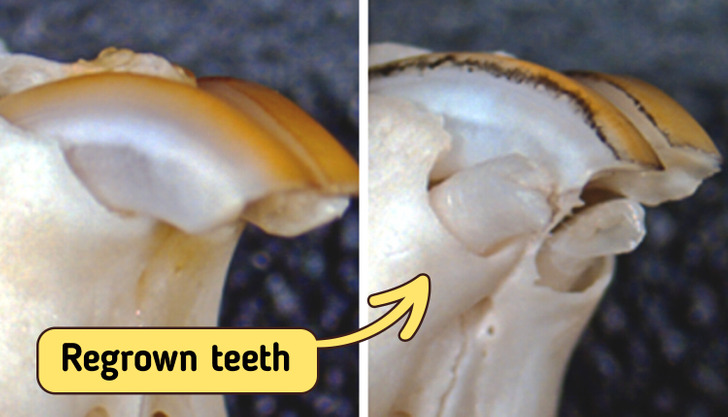
On April 13, 2021, the University of Kyoto posted its first pic of newly-grown teeth in mice.
BMP and Wnt are involved in more than just tooth development; they affect the growth of organs and tissues early in the body’s development. Because drugs affecting them directly might have broad side effects, scientists are cautious. To find a potentially safer method, researchers focused on the gene USAG-1, thinking that aiming at factors countering BMP and Wnt specifically in tooth development could be more precise.
“We knew that suppressing USAG-1 benefits tooth growth. What we did not know was whether it would be enough,” added Takahashi.
The first results
Scientists looked at how different monoclonal antibodies affect USAG-1. Monoclonal antibodies are often used to treat things like cancer and arthritis and for making vaccines. Tests with this antibody showed that BMP signaling is crucial for deciding the number of teeth in mice. Also, just one treatment was enough to grow a whole tooth. Further tests confirmed these positive results in ferrets too.
“Ferrets are diphyodont animals with similar dental patterns to humans. Our next plan is to test the antibodies on other animals, such as pigs and dogs,” explained Takahashi.
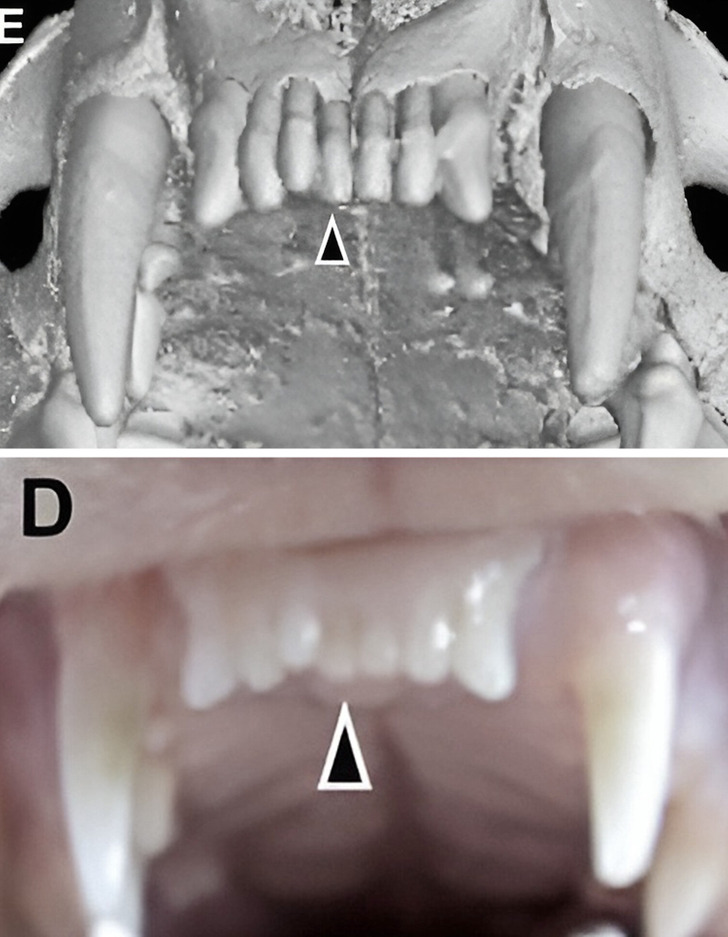
Fully regrown frontal teeth in ferrets
The next steps
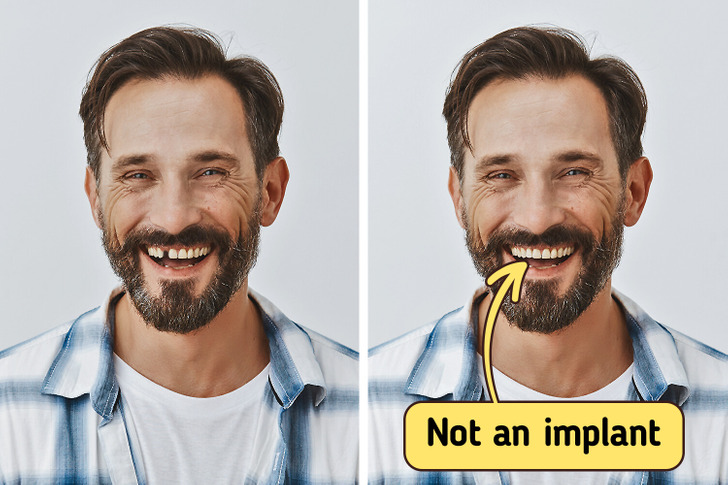
Now, scientists are going to test the drug on healthy adults. If that goes well, the team plans to try it on kids aged 2 to 6 with a rare tooth problem called anodontia, a genetic disorder defined as the absence of all teeth. These kids will get one shot of the drug to see if it makes their teeth grow. If everything works out, the medicine might be approved by 2030.
Takahashi sees the new medicine as an additional choice for individuals who are missing some or all of their teeth.
“The idea of growing new teeth is every dentist’s dream,” Takahashi told the Japanese newspaper, The Mainichi in June this year. “I’ve been working on this since I was a graduate student. I was confident I’d be able to make it happen.”
So hopefully, by the year 2030, humans will get a chance to have their third generation of teeth grown and say goodbye to implants. Until then, make sure to keep your teeth strong and healthy — this article will help you with that.
Preview photo credit KyotoU_News / Twitter
Gender Reveal Event Goes Awry as Husband Declares to Pregnant Wife He’s Sterile – Story of the Day

At John and Anne’s gender reveal party, an unexpected note turns their celebration into a battleground of accusations, challenging their marriage and trust. Yet, an unexpected revelation from a close friend emerges, disrupting the turmoil and reshaping their story in unforeseen ways.
Anne stood amidst the vibrant decorations, her heart fluttering with anticipation, as friends and family gathered in the backyard for the much-awaited gender reveal party. Laughter and excitement filled the air, swirling around the expectant couple.
John, her husband, stood by her side, his grin matching hers as they both clutched the oversized balloon. The moment arrived—their chance to unveil the gender of their awaited child.
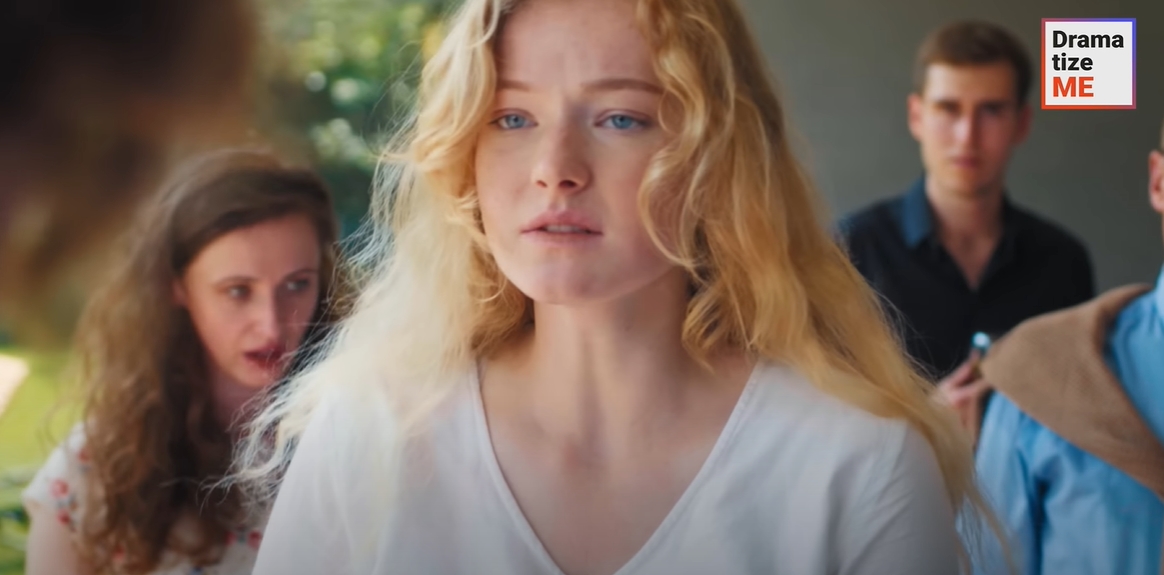
For illustration purposes only | Source: Youtube/DramatizeMe
John grinned as he held out a black balloon and playfully bumped it against his wife Anne’s baby bump. The words ‘boy or girl?’ were printed on the side of the balloon in white. Anne grinned back as she stared into his eyes. She could barely contain her excitement as she raised the pin to burst the balloon.
All of the young couple’s close friends and family were gathered on the deck of John’s parent’s home to celebrate the baby’s gender reveal. The sun shone brightly on the estate’s verdant lawn and well-manicured garden. Bunches of pink and blue balloons decorated the deck, and paper lanterns dangled from the beams.
When Anne burst the black balloon, a spray of white confetti added to the festive decorations. The guests clapped and cheered, but a frown wrinkled Anne’s brow as she spotted a larger slip of paper among the confetti. She placed one hand against her belly and bent over to pick it up.
Anne stared at the three words written on the slip of paper. They didn’t make any sense. It was definitely John’s handwriting—she recognized the way he curled the top branch of his ‘f’ and the flattened shape of his ‘r’—but none of that explained why he’d write such a thing.

For illustration purposes only | Source: Youtube/DramatizeMe
“‘I am infertile,’” Anne read the words out loud and stared at her husband. “What is this, some kind of sick joke?”
Hushed exclamations of surprise passed among the guests. All eyes were on John as his expression darkened to a fierce glare.
“I did a test and found out that I can’t have kids.” John pulled a paper from his pocket and held it out to Anne. “So your little guy is not mine!”
Anne stared in shock at John’s sperm count results. The paper shook in her fingers as her mind struggled to make sense of the shocking turn her gender reveal party had taken. This couldn’t be happening; Anne refused to accept it!
“The party is over!” John declared as he stormed inside through the sliding door. “All of you can leave now.”
“John!” Anne called after her husband. “What’s happening? Is this a prank or something?”
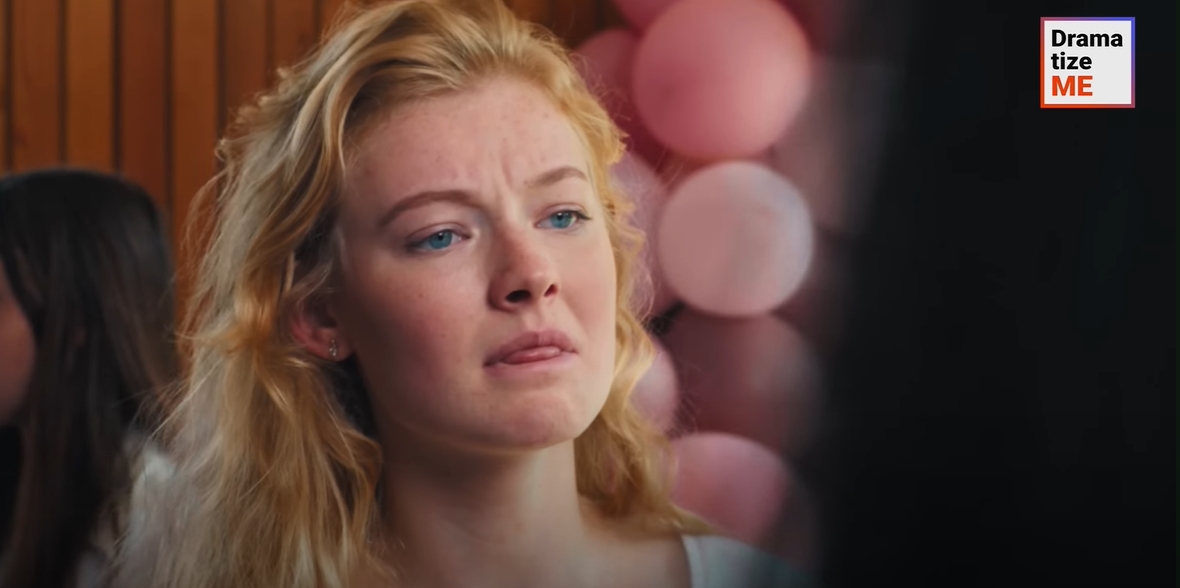
For illustration purposes only | Source: Youtube/DramatizeMe
As the shattered remnants of the party dispersed, Julie, Anne’s best friend, trailed after John, her steps purposeful yet conflicted. She caught up to him near the edge of the yard.
“John, we need to talk,” Julie’s voice was firm, laced with an undercurrent of dismay.
He turned. “Not now, Julie. I’ve got enough on my plate.”
“You can’t just accuse Anne like that,” Julie retorted, her eyes flashing. “This is cruel, even for you.”
He scoffed, a bitter edge to his voice. “Why do you care so much, Julie? It’s not your problem. Let Anne deal with the mess she made. I won’t let her take all my money with this pregnancy.”

For illustration purposes only | Source: Youtube/DramatizeMe
Julie’s disbelief morphed into a flitting moment of realization. “You don’t care about Anne or the baby, do you? This is about your money?”
A derisive chuckle escaped John’s lips. “Of course, it is. I won’t let her ruin me. She’ll get what she deserves.”
Julie’s shock turned to a simmering anger. “You’re despicable, John. I believed you, but I’m not so sure now.”
John waved her off, his dismissive gesture cutting through the tension. “Believe what you want. But this is between Anne and me. Stay out of it.”
With a heavy heart, Julie watched him stride away, his callous words lingering in the air. She battled conflicting emotions, torn between her loyalty to John and her growing doubts about his accusations against Anne.
***
Alone in the dimly lit bedroom of the Campbell’s home, Anne’s hands trembled as she reached for her purse, tears tracing silent paths down her cheeks. The weight of John’s accusations bore down on her, leaving her shattered and lost in a whirlwind of emotions.
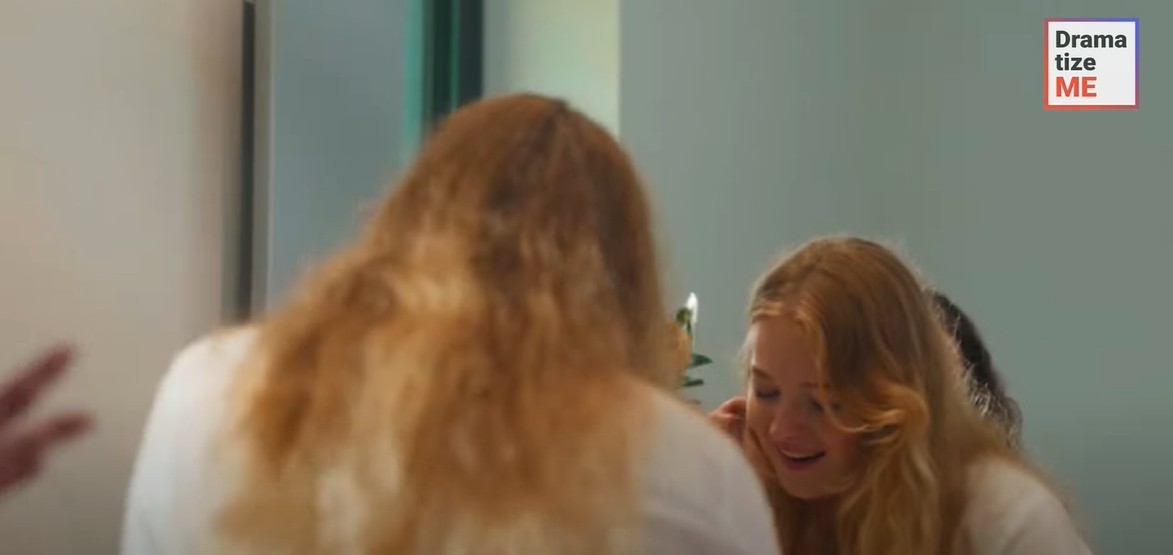
For illustration purposes only | Source: Youtube/DramatizeMe
A soft hand on her shoulder made her jump. Anne turned, her tear-streaked face meeting Julie’s concerned gaze.
“Anne…” Julie’s voice was filled with empathy, her eyes reflecting the turmoil she felt for her friend.
Anne struggled to compose herself, her voice choked. “Julie, I don’t understand. How could he accuse me of such a thing?”
Julie knelt beside Anne, offering a comforting embrace. “I know, I know. But you have to stay strong. You’ve done nothing wrong.”
Julie’s words offered a sliver of solace to Anne’s tormented heart. “I thought he trusted me,” she whispered, her voice cracking with sorrow.
“His own fears blind him,” Julie murmured, her tone filled with conviction. “But you’re not alone in this, Anne. I believe in you.”
Anne leaned into Julie’s comforting presence, finding a glimmer of strength. In that shared moment, Julie’s unwavering support became a lifeline for Anne, helping her gather the fragments of her shattered resolve.
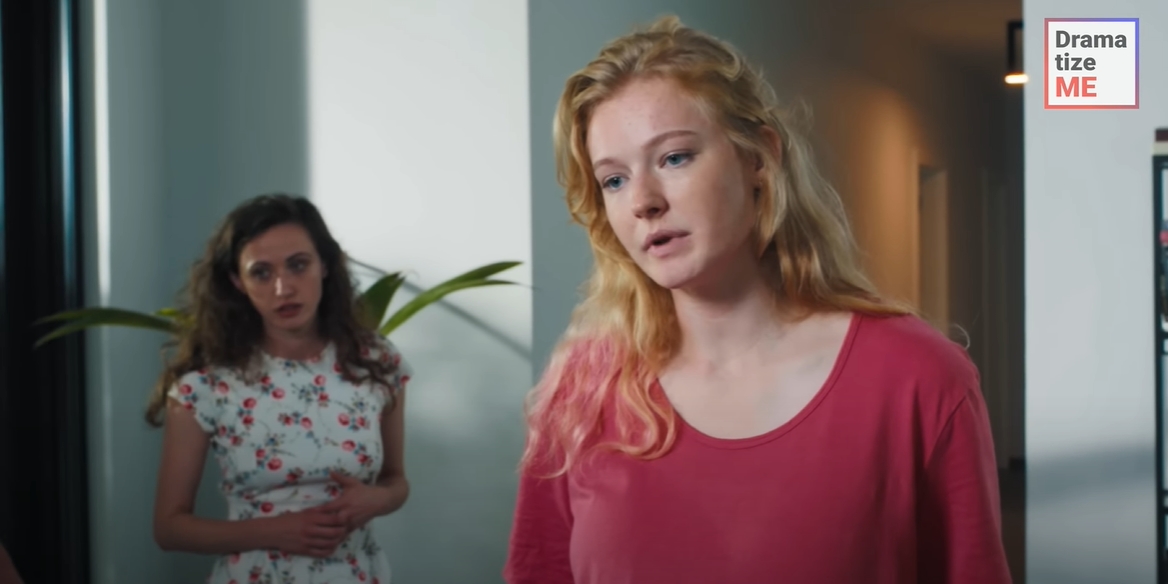
For illustration purposes only | Source: Youtube/DramatizeMe
***
In the Campbells’ opulent living room, a heavy silence draped the air as Anne stood, facing the stern faces of Mr. and Mrs. Campbell. Stubborn as ever, John stood by their side, his mouth set in a hard line.
“I’m giving you one last chance to reconsider,” Anne’s voice wavered slightly, but her determination shone through. “Please, you know me. You know I could never—”
Before Anne could finish, Mr. Campbell’s voice cut through the tense atmosphere, filled with finality. “Anne, we can’t ignore the evidence. John has made his position clear. We won’t stand by and watch you ruin our family’s name.”
Tears welled in Anne’s eyes, but before she could respond, John sneered, “Just take the offer, Anne. It’s the least you can do after all this drama.”
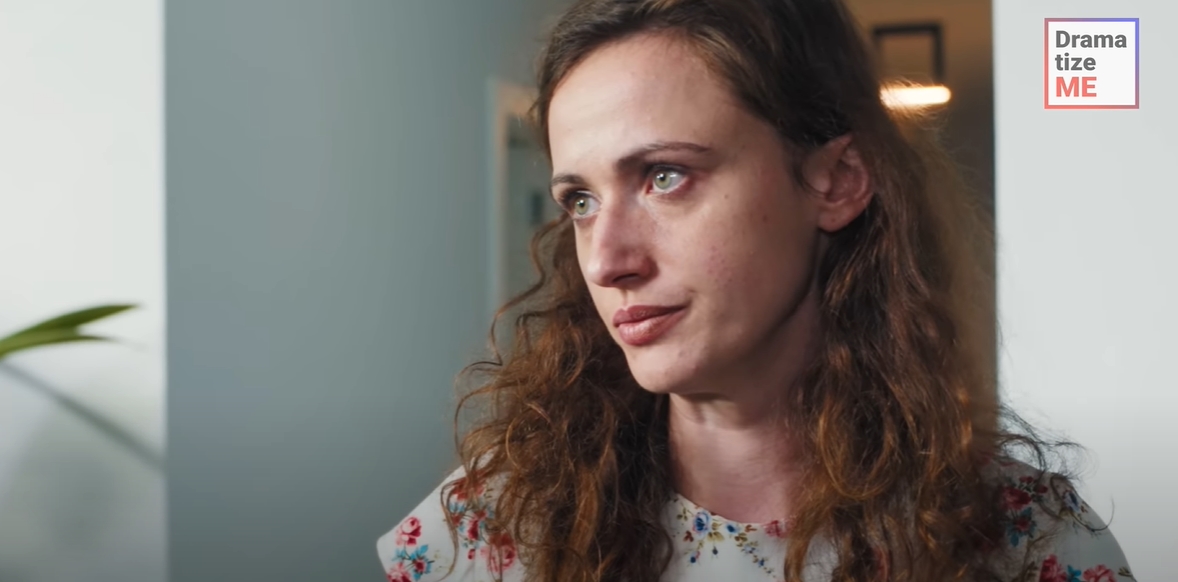
For illustration purposes only | Source: Youtube/DramatizeMe
Julie, unable to bear the injustice any longer, stepped forward, her voice trembling yet resolute. “Stop this, all of you!” Her outburst drew startled glances.
“John, you think you’re so clever, but you’re not,” Julie’s eyes blazed. “You orchestrated this mess with the gender reveal to accuse Anne. But you’ve been lying to everyone, including me.”
The room fell into a stunned silence, tension crackling in the air.
Julie took a deep breath, her voice shaking but unwavering. “Anne isn’t lying. But guess who is? I am pregnant, and the father is none other than John.”
Gasps echoed in the room as the weight of Julie’s revelation settled in. Anne’s tears turned from sorrow into shock and relief, and the Campbells exchanged incredulous glances.

For illustration purposes only | Source: Youtube/DramatizeMe
John’s face contorted in a futile attempt to maintain his façade. “That’s a lie! You can’t prove anything,” he spat out.
But the damage was done. The truth hung in the air, a damning testament to John’s deceit. The Campbells’ disbelief wavered, teetering on the edge of comprehension. Finally, the older couple exchanged a wordless yet resolute glance.
Mrs. Campbell’s voice quivered, laden with a feeling of sorrow that cut through the room’s thick tension. “John, your actions have been unforgivable. You’ve not only accused Anne falsely but have betrayed her trust and tarnished our family’s name.”
Mr. Campbell’s stern gaze bore down on his son, his disappointment simmering into a potent blend of anger and remorse. “You’re no longer welcome here. Leave.”
John’s protestations crumbled against the weight of his parents’ condemnation. He sputtered in disbelief, trying to salvage what remained of his pride, but their resolve remained unyielding.
“You can’t do this!” John’s voice cracked with desperation.
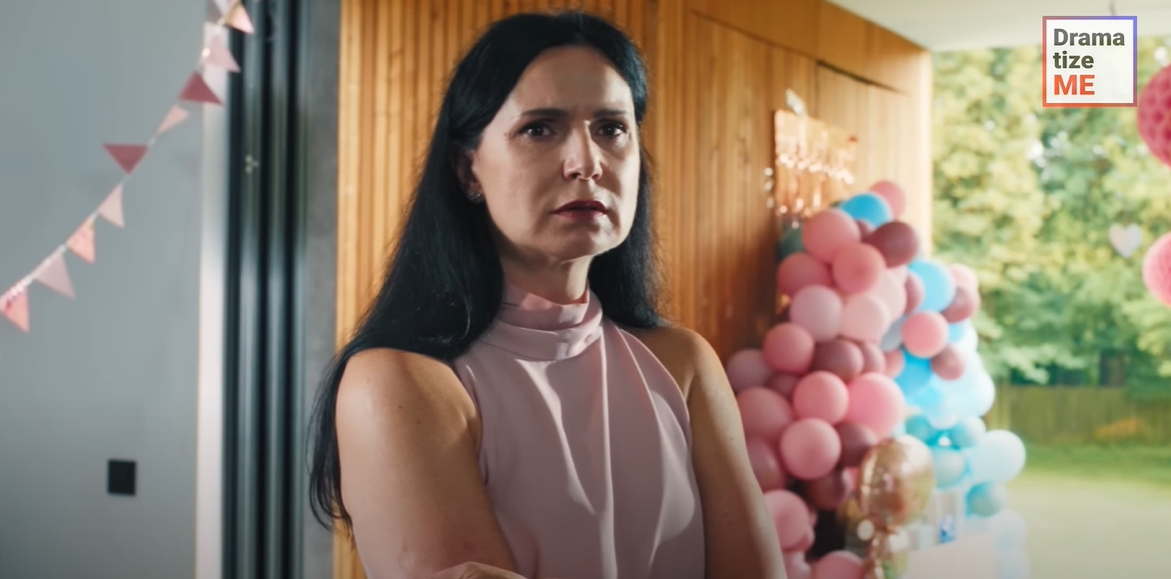
For illustration purposes only | Source: Youtube/DramatizeMe
Mrs. Campbell’s eyes brimmed with unshed tears, her voice laden with finality. “Yes, we can. It’s time for you to face the consequences of your actions.”
In a whirlwind of shattered illusions and dawning reality, John stormed out, the door slamming shut behind him. He was left to face the consequences of his deceit and cruelty, abandoned by the very family he had betrayed.
The silence that followed was heavy, the weight of an irrevocably fractured family settling upon those who remained. Yet, a newfound solidarity began to emerge, offering a glimmer of hope for Anne and Julie as they faced the uncertain future together.
Her eyes glistening with unshed tears, Anne turned towards Mr. and Mrs. Campbell, her heart heavy yet hopeful. The older couple offered a heartfelt apology but were too ashamed of their son to approach their daughter-in-law.
“I… I forgive you,” Anne’s voice quivered, her gaze soft. “I know this has been hard for all of us.”
Mrs. Campbell’s eyes welled up with gratitude and remorse. “Anne, dear, we’re deeply sorry for doubting you. We’ll make amends.”
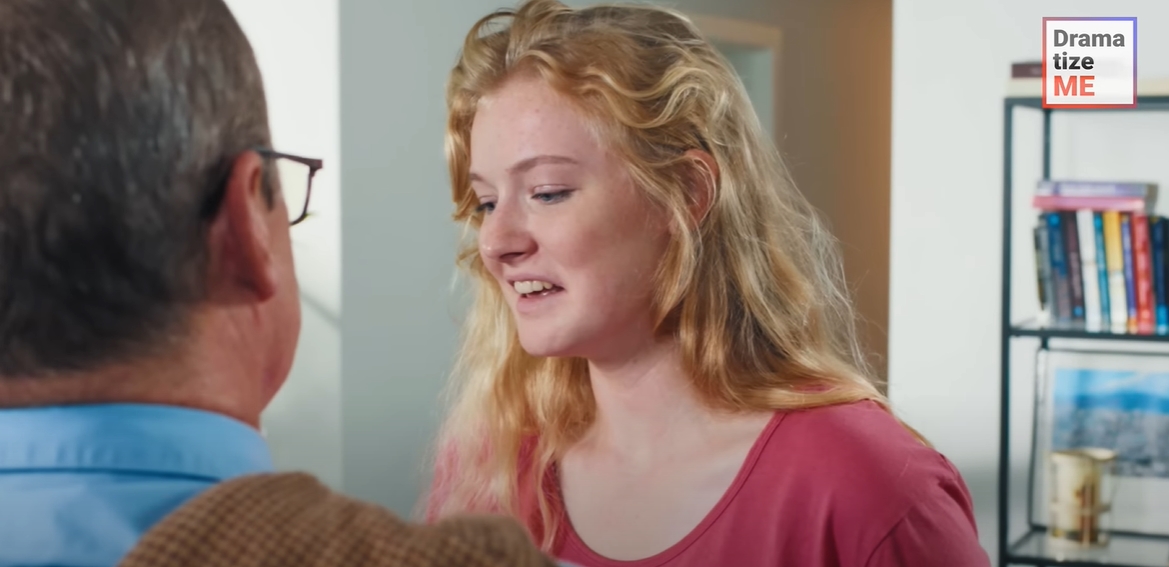
For illustration purposes only | Source: Youtube/DramatizeMe
Mr. Campbell nodded in earnest agreement. “We’ll support you, Anne. You and the baby.”
Anne’s heart swelled with gratitude as the weight of unjust accusations lifted. “Thank you. But there’s someone else who needs your support too.” She turned to Julie, who stood by her side, a silent pillar of strength.
“Julie is also having his child,” Anne’s words held both strength and empathy. “She needs your support just as much as I do.”
Mr. and Mrs. Campbell exchanged a somber yet understanding glance, the gravity of the situation sinking in. “Of course, Anne. We’ll be there for both of you,” Mrs. Campbell affirmed.
Then, Anne took a deep breath, her trembling hands resting gently on her belly.
“And there’s something else,” Anne’s voice was filled with joyous anticipation, a glimmer of hope breaking through the shadows. “Our baby… it’s a boy.”

For illustration purposes only | Source: Youtube/DramatizeMe
A collective gasp of joy and excitement filled the room. Tears mingled with smiles as the revelation sparked newfound jubilation. The promise of a baby boy brought a surge of hope and unity, knitting together the torn fabric of their lives.
Tell us what you think about this story, and share it with your friends. It might inspire them and brighten their day.
If you enjoyed this story, here’s another one: Wealthy businessman Larry is watching a news report on a bomb threat in Paris when a beggar runs into the reporter. He instantly recognizes the beggar as his wife, Susan, who stole $500,000 from him and disappeared 12 years ago. He leaves for Paris immediately to find her and get answers.
This piece is inspired by stories from the everyday lives of our readers and written by a professional writer. Any resemblance to actual names or locations is purely coincidental. All images are for illustration purposes only. Share your story with us; maybe it will change someone’s life.



Leave a Reply